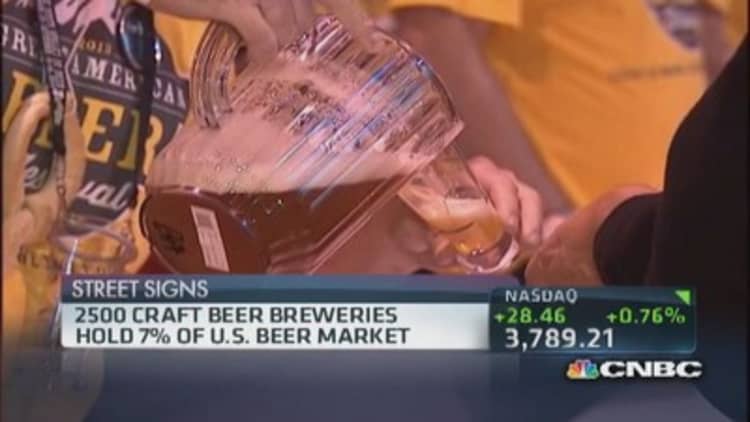When Boulevard Brewing founder John McDonald announced he was selling his company to Belgium-based brewery Duvel Moortgat for a reported $100 million, the reaction was as swift as it was predictable.
Boulevard fans in Kansas City took to social media to cry foul about their hometown brewery being sold to a foreign entity. A local Kansas City sports talk radio station even stopped talking sports momentarily to talk beer and the impact of the Boulevard deal on the local community.
While Kansas City beer drinkers were struggling to come to grips with Boulevard's new ownership, McDonald had long ago made peace with his decision.
"I slept very well (the night before the sale). I drove up to the brewery the next day and steam was coming out of the stacks and it smelled like beer and for a moment I thought 'wow.'" he said. "But it didn't take me long to think I'm doing the right thing about the future of our brewery."
McDonald said he'd spent a lot of time in recent years thinking about the best path forward for the brewery he started in 1989 and built into the 12th-largest craft brewery in the United States. While the decision wasn't easy, after nearly 25 years of running Boulevard he felt the timing was right to make a change.
(Read more: World Series beer bet: Battle of the breweries )
"I'm 60 years old and it was time to start thinking about the next chapter in Boulevard's history," he continued. "I've known about [Duvel] before I even started my own brewery and have incredible respect for it and what they've done. They will be fantastic partners going forward."
The question of how to best move forward is one that will be faced by a growing number of brewers, who after decades of building their businesses, will be ready to transition away from day-to-day control.

The reality for many craft brewers is that after years of work and growth, their equity is still tied up in the brewing facilities and infrastructure they have worked so hard to build.
"Many of these brewers started their business when they were 30 years old, and now they're nearing 60 or 65 and they're wondering: Do I want a little swim-to-shore money or is it time to set things up for the next generation?" said Dick Leinenkugel, business development manager for MillerCoors' craft division,Tenth and Blake.
The Jacob Leinenkugel Brewing Company, which dates back to 1867, was among the first craft brewers to sell to a larger entity, when it was purchased by Miller Brewing (now MillerCoors) in 1987.
(Read more: First tulips, then housing...Is beer bubble next?)
While MillerCoors is now the parent company, the Leinenkugel family continues to play an active role in its namesake brewery with Jake Leinenkugel serving as president and two of his sons, the sixth generation of brewing Leinenkugels, also involved with the business.
Leinenkugel said his family's brewery likely would not have survived without the Miller deal and he expects similar moves by other craft brewers in near future.
"I think there will be a whole series of partnerships or other business transactions in the next three to five years," said Leinenkugel.
Some of the larger craft beer companies have already taken moves to shape their future.
Colorado-based New Belgium Brewing, which got its start in 1991 and has grown into the third largest craft brewery, recently implemented an employee stock ownership plan designed to help keep it independent. Under the plan, New Belgium CEO and co-founder Kim Jordan sold her controlling stake to the company's ESOP and the brewery is now 100 percent employee-owned.
Another craft beer pioneer, Ken Grossman, who founded Sierra Nevada Brewing Company in 1979 and built it into the second largest craft brewery in the country behind only Jim Koch's Boston Beer Company, is in the process of transitioning leadership of his company to his children.
(Read more: The booming beer brand trying to be the next Corona)
Grossman's plan appeals to Sam Calagione of Dogfish Head Craft Brewed Ales in Delaware. Calagione, who founded Dogfish Head in 1995 and operates it with his wife Mariah, said he's been offered what he called "F-U" money from venture capitalists and larger breweries.
But Calagione said he feels an obligation to keep Dogfish Head family-owned until his two young children are old enough to decide if they want to take it over.
"It's my hope that one of our children will run our company, but if they choose not to, then I need to respect that," he said. "If my kids don't want to run it and I have an opportunity to sell to a great company like Duvel when I'm 60 or 65, then I hope I'll entertain that with my head held up high."
Boulevard's McDonald said a key criteria for any sale was finding a company that would be a good steward of the business he worked so hard to build.
Industry watchers say the cultures of Duvel, which also acquired New York-based Brewery Ommegang in 2003, and Boulevard are well-aligned.
"Duvel is a company that's very focused on providing high-quality beers," said Chris Furnari, the editor of beer industry website Brewbound.com. "If you look at some of Boulevard's highest growth, it's coming from their Smokestack series, which is their high-quality, large-bottle beers. It fits perfectly with the really high-end products Duvel and Ommegang are already providing to consumers."
Duvel's history of acquisition without tainting the acquired brand is not lost on Dogfish Head's Calagione.
John McDonald "basically sold the majority equity of his business to a company that's passionate about beer first and business second," he said. "I think he's made one of the most graceful transitions in ownership of a craft brewery that's been made yet."
—By CNBC's Tom Rotunno. Follow him on Twitter @TomRotunno.


